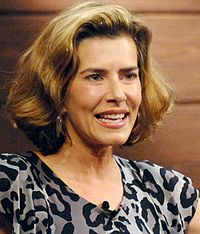- Maitê Proença
-
Maitê Proença 
Born Maitê Proença Gallo
January 28, 1958
São Paulo
 Brazil
BrazilOccupation actress Website http://maite.com.br/ Maitê Proença Gallo (b. São Paulo, 28 January 1958) is a Brazilian actress.
Contents
Biography
Maitê Proença was born in São Paulo, Brazil in 1958. Her grandparents were Portuguese, French and Italian. As a child, Maitê studied in an American School and, thus, speaks fluent English, as well as French, Spanish, and Italian. She attended the undergraduate psychology programme at the Pontifícia Universidade Católica de São Paulo and the University of São Paulo where she studied Journalism. Between 1977 and 1979 she traveled around the world to Europe, Asia and Africa. This habit Maitê has maintained and, throughout her life has travelled to more than 70 countries. In 1979 Maitê had a severe car accident. She was submitted to two surgeries and had to stay in bed for almost a year. Maitê also attended a number of courses at the Sorbonne in the end of the 1970s while living in France. Met her ex-husband Paulo in 1982 . They stayed together for 13 years and divorced 2 years after the birth of their only daughter Maria, born in 1990. She has worked on Brazilian telenovelas, films, and plays. Her role in the telenovela Dona Beija was her first major TV success in both Brazil, Portugal and some 50 other countries where it was exhibited. She is a writer of two books. Maitê has a column in the Brazilian magazine Época. A book was released with the best of her essays. The second book, Uma Vida Inventada sold 100.000 copies inside Brazil, and was exported to Portugal. She has also written two plays one of which, As Meninas, one her several prizes. Her mother was Margot Proença, a philosophy and music teacher who died when Maitê was 12. Her father was Eduardo Gallo (died in 1989). In 2005 she published her first book: Entre ossos e a escrita. She has been also a TV host for Video Show (1983), Programa de Domingo (1987) and Saia Justa (2006/2007). In 2006 Maitê wrote her first theater play Achadas e Perdidas. In 2002 she made her debut as a theater producer with the play Buda. She has a younger brother, René Augusto Proença Gallo, born in 1963.[1] Maitê is currently single. In 2009, due to controversial remarks on the Brazilian TV show Saia Justa, where she acts as a host, Maitê Proença prompted public outrage in Portugal[2][3] and was accused of being lusophobic which is not at all correct since she has affirmed inumerous times her love for Portugal. She has since then denied the accusation and recorded several apologies,[4] as well as issuing one on her official blog. Proença emphasized that despite the misundersanding, she is from recent Portuguese ancestry and likes Portugal and the Portuguese.[5] For about a week, the affair was discussed or reported on several Portuguese television networks and major newspapers.
Filmography
Telenovela
- Dinheiro Vivo (1979)
- Guerra dos Sexos (1983)
- A Marquesa de Santos (1984)
- Dona Beija (1986)
- Sassaricando (1987)
- Salvador da Pátria (1989)
- Felicidade (1991)
- O Sorriso do Lagarto (1991)
- A Vida Como Ela É (1997)
- Torre de Babel (1998)
- Da Cor do Pecado (2004)
- Caminho das Índias (2009)
- Passione (2010)
Films
- Brasa Adormecida (1984)
- A Dama do Cine Shangai (1987)
- Kuarup (1989)
- 16060 (1995)
- Tolerância (2000)
- The Forest (2002)
- Jogo Subterrâneo (2003)
- Onde Andará Dulce Veiga (2005)
Theatre
- La Malassangre (1988)
- Na Sauna (1989)
- Histórias de Nova York - Dorothy Park (1994)
- Confissões das Mulheres de Trinta (1994/5)
- Isabel (2000)
- Com a Pulga Atrás da Orelha (2002)
References
External links
Categories:- 1959 births
- Living people
- Brazilian film actors
- People from Campinas, São Paulo
Wikimedia Foundation. 2010.
